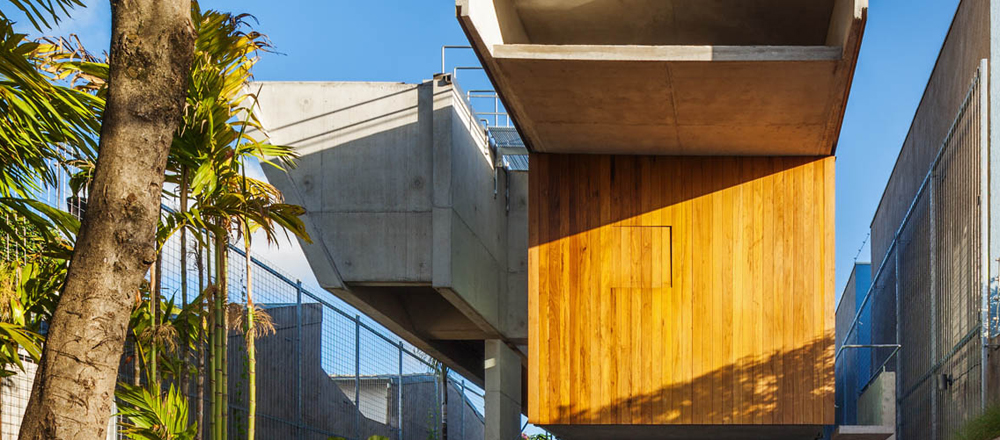Urban recreation: Weekend house in São Paulo

Pool, Conservatory, Garden: the three main functions of a weekend house in the Brazilian metropolis of São Paulo have been distributed by architect Angelo Bucci and his office SPBR over vertically stacked volumes of in-situ concrete. The spaces in between have become a green idyll of intimacy and harmony with nature.
Architect: Angelo Bucci / SPBR Architects
Location: São Paulo, Brazil
Architect: Angelo Bucci / SPBR Architects
Location: São Paulo, Brazil
São Paulo is known as an enormous metropolis of about 20 million inhabitants, a seemingly endless sea of houses exposed to the persistent noise of the city. Residents seek relief on the coast; to do this, they must merge into the omnipresent traffic jams. But one couple has decided to act against the habit of fleeing the city. Rather, by commissioning Angelo Bucci to build a weekend house in the middle of São Paulo, they have taken the side of infrastructural autonomy.
The narrow lot on which this house stands is located near the business centre on the Avenida Faria Lima. Despite this atypical urban situation, the architects have brought about a small spatial miracle. Their decision to develop the structure on the vertical plane and fully exploit the neighbourhood’s standard height of 6 metres has enabled a real gain in space and an exciting stage for the three most important elements of the house’s recreational quality: stacked on three levels, the building offers generous areas for a ground-floor garden, a conservatory on the first upper floor and a rooftop terrace with swimming pool.
The narrow lot on which this house stands is located near the business centre on the Avenida Faria Lima. Despite this atypical urban situation, the architects have brought about a small spatial miracle. Their decision to develop the structure on the vertical plane and fully exploit the neighbourhood’s standard height of 6 metres has enabled a real gain in space and an exciting stage for the three most important elements of the house’s recreational quality: stacked on three levels, the building offers generous areas for a ground-floor garden, a conservatory on the first upper floor and a rooftop terrace with swimming pool.
The exterior view is sheltered, which is typical for the building culture in large Brazilian urban areas. The volumes of the house seem to float above the concrete wall which delimits the property from the street. The massive elements, made of exposed concrete and partly clad in wooden planks, are almost completely closed off. A stairway to one side crosses the threshold between public and private space in the hidden underground garden, which rises as a riot of tropical green behind the surrounding wall.
The conservatory and pool are found in two separate volumes of exposed concrete, both of which are visible from the street. The distance between these volumes measures two metres and creates a light-flooded column which directs the view throughout all levels of the house. Supports on the ground floor hold the concrete volumes, which are twelve metres deep. The suspended load-bearing structure under the pool has been created as a living space whose façade, which consists of a fixed pane of blue-tinged glass, faces the inner courtyard.
This interlocking system of open spaces and roofed-in areas is connected via stairs. The garden is integrated into the ground floor and offers a private, shady retreat as well as shelter from the sun’s glare and public view. The functions of the ground floor are not delimited by walls. The modular floor, which comprises pathways, pedestals, water basins and steps, creates a topographical spatial landscape for open use.
The sundeck on the rooftop terrace underscores the holiday home’s situation as a private island in the public sea of houses. While the full six metres of height allows a panoramic view over the city, it is impossible for others to see the private platform.
Angelo Bucci/SPBR Architects have certainly made the most of this narrow lot. Elements which are allocated a secondary position in ordinary houses determine the form of this building’s typography and its fundamental living spaces. The resulting quality arises from the interplay of open areas and expressively hovering structural bodies. The house is directed towards the slender inner courtyard, which elevates the horizontal openness to a synergetic continuum of space.
Project data
Material: in-situ concrete, wood
Site are: 269.5 m²
Usable space: 183.4 m²
Completion: 2013
Structural engineer: Ibsen Puleo Uvo
Landscape architect: Raul Pereira
Team: Nilton Suenaga, Tatiana Ozzetti, Ciro Miguel, Eric Ennser, João Paulo Meirelles de Faria, Juliana Braga, Fernanda Cavallaro, Victor Próspero
Site are: 269.5 m²
Usable space: 183.4 m²
Completion: 2013
Structural engineer: Ibsen Puleo Uvo
Landscape architect: Raul Pereira
Team: Nilton Suenaga, Tatiana Ozzetti, Ciro Miguel, Eric Ennser, João Paulo Meirelles de Faria, Juliana Braga, Fernanda Cavallaro, Victor Próspero
